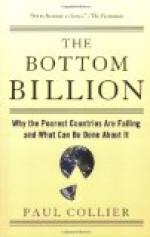Pretty good world if you take it all round—
Pretty good world, good people!
Better be on than under the ground—
Pretty good world, good people!
Better be here where the skies are as
blue
As the eyes of your sweetheart
a-smilin’ at you—
Better than lyin’ ’neath daisies
and dew—
Pretty good world, good people!
Pretty good world with its hopes and its
fears—
Pretty good world, good people!
Sun twinkles bright through the rain of
its tears—
Pretty good world, good people!
Better be here, in the pathway you know—
Where the thorn’s in
the garden where sweet roses grow,
Than to rest where you feel not the fall
o’ the snow—
Pretty good world, good people!
Pretty good world! Let us sing it
that way—
Pretty good world, good people!
Make up your mind that you’re in
it to stay—
At least for a season, good
people!
Pretty good world, with its dark and its
bright—
Pretty good world, with its
love and its light;
Sing it that way till you whisper, “Good-night!”—
Pretty good world, good people!
Frank L. Stanton.
From “The Atlanta Constitution.”
ODE TO DUTY
In the first stanza the poet hails duty as coming from God. It is a light to guide us and a rod to check. To obey it does not lead to victory; to obey it is victory—is to live by a high, noble law. In the second stanza he admits that some people do right without driving themselves to it—do it by instinct and “the genial sense of youth.” In stanza 3 he looks forward to a time when all people will be thus blessed, but he thinks that as yet it is unsafe for most of us to lose touch completely with stern, commanding duty. In stanzas 4 and 5 he states that he himself has been too impatient of control, has wearied himself by changing from one desire to another, and now wishes to regulate his life by some great abiding principle. In stanza 6 he declares that duty, though stern, is benignant; the flowers bloom in obedience to it, and the stars keep their places. In the final stanza he dedicates his life to its service.
Stern Daughter of the Voice
of God!
O Duty! if that name thou
love
Who art a light to guide,
a rod
To check the erring, and reprove;
Thou who art victory and law
When empty terrors overawe;
From vain temptations dost
set free,
And calm’st the weary strife of
frail humanity!
There are who ask not if thine
eye
Be on them; who, in love and
truth
Where no misgiving is, rely
Upon the genial sense of youth:
Glad hearts! without reproach
or blot,
Who do thy work, and know
it not:
Oh! if through confidence
misplaced
They fail, thy saving arms, dread Power!
around them cast.




